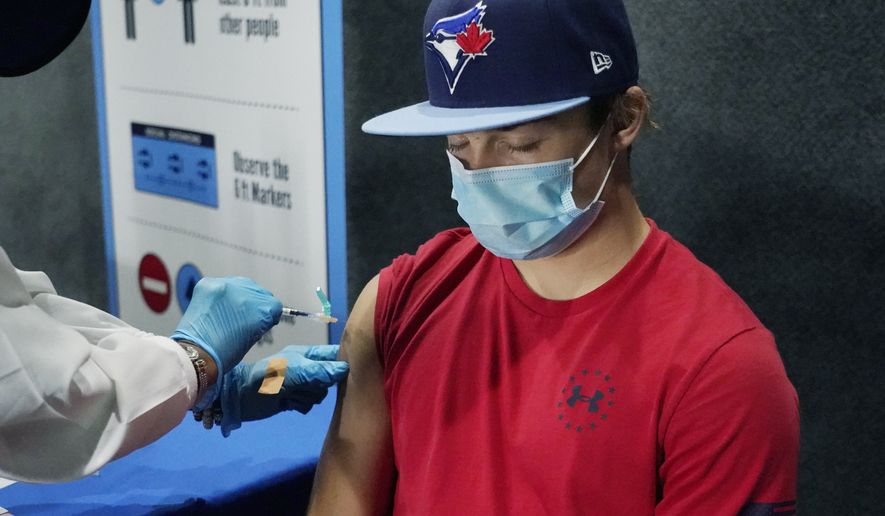Three-quarters of U.S. adults who say they will “definitely not” get a COVID-19 vaccine believe getting the shots is a bigger risk to their health than becoming infected with the coronavirus, according to a poll released Wednesday that underscores the challenges of getting the most resistant to come forward.
The Kaiser Family Foundation also found the majority of unvaccinated people believe the pandemic has been exaggerated in the news and are far less likely than vaccinated people to think the emergence of new variants will worsen the pandemic in the U.S. or their local areas.
President Biden, governors and the private sector are scrambling to lift a vaccination rate that remains stuck at around 50% of the U.S. population even as the delta variant of the coronavirus rips through pockets of the country. Some officials are pleading, while others are turning to mandates to compel vaccination.
The Kaiser Family poll found there is a “wait and see” portion of the country that could be nudged into taking the shots. In fact, a quarter of the unvaccinated told pollsters they are very or somewhat likely to get the shots by the end of the year.
Others are dug in. Among the 3 in 10 American adults who are unvaccinated, 46% say they “definitely” do not plan to get immunized.
Kaiser found that 75% of adults who will definitely not get the vaccine feel the shots are a bigger threat to their health, 14% fear the virus to a greater degree and 9% aren’t sure.
It’s a closer call in the wait-and-see group, with 55% fearing the vaccine, and 45% seeing the virus as a bigger threat.
Also, 57% of unvaccinated adults think the media has “generally exaggerated” the threat of COVID-19, which has killed more than 600,000 people in the U.S., versus 17% of the vaccinated who think it has been overblown.
Most Americans think the delta strain or other variants will worsen the pandemic in the U.S. or locally, though only 30%-40% of the unvaccinated feel that way.
The unvaccinated are less likely to believe the shots are effective at staving off disease or preventing transmission though a decent share believes they can stave off the worst medical outcomes.
“Even among those groups with lower vaccine rates, including young people, Black and Hispanic adults, and Republicans, at least 4 in 10 report thinking the vaccines are extremely or very effective at preventing hospitalization or death,” the pollsters said.
The poll found the majority of Americans have heard at least some news about the possibility of needing booster shots in the future.
Three in four vaccinated adults said the specter of a booster does not make them worried they are unprotected right now, although Black and Hispanic recipients were more likely than White recipients to worry about their level of protection.
Some countries are starting to give a third dose to older adults or people who have other health conditions. The World Health Organization on Wednesday said wealthier countries should hold off on boosters until the rest of the world gets a fair share of initial doses.
White House press secretary Jen Psaki said the U.S. can be a generous donor while serving its own population if boosters are needed.
“We feel it’s a false choice, and that we can do both,” Ms. Psaki said.
A slim majority of Americans — 51% — told Kaiser that the federal government should recommend that employers require their workers to get the COVID-19 vaccine unless they have a medical exemption, while 45% oppose the idea.
Only 16% of unvaccinated adults support the idea, and there is a massive partisan divide: 75% of Democrats support a federal recommendation, compared to 29% of Republicans and 46% of independents.
The finding reflects attitudes among governors and lawmakers, with Republicans generally slamming vaccine mandates, while New York City Mayor Bill de Blasio, a Democrat, announced a plan to require proof of vaccination for entry to city restaurants, gyms and performance halls.
“I want people to get vaccinated to feel they can live life fully, have a lot of freedom. The reward of vaccination is freedom,” Mr. de Blasio told CBS “This Morning” on Wednesday. “Tragically, if you don’t get vaccinated, you’re going to be left out.”
A Trafalgar Group poll commissioned by conservatives at the Convention of States Action found Americans generally do not support “vaccine shaming,” or open criticism of the unvaccinated.
Nearly 60% of Americans said it is inappropriate for public figures to be openly critical of them while nearly 24% think criticism is appropriate and the rest aren’t sure.
There is a partisan split, with nearly 78% of Republicans finding the criticism distasteful and just over 40% of Democrats thinking it is inappropriate. A little over 61% of independents oppose public criticism of the unvaccinated.
• Tom Howell Jr. can be reached at thowell@washingtontimes.com.




Please read our comment policy before commenting.